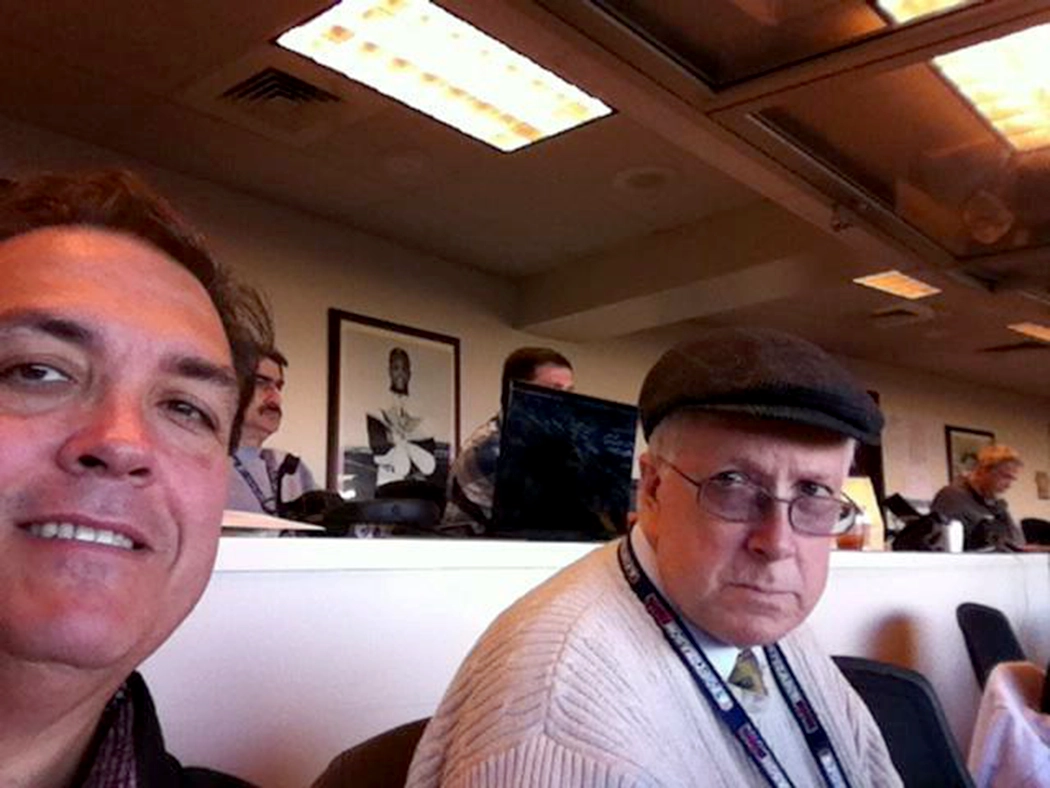THE COMMISH
It was 1983, and the Orioles were playing the Cardinals in a normal evening of spring-training baseball. I was the emergency beat writer covering the Orioles, filling in for a Baltimore News American colleague who required knee surgery.
I just turned 24 years old, and wasn’t ready to handle the duty of reporting on a major-league baseball team. I was nervous, clumsy, lacked confidence, and was just hoping to survive an unnerving experience.
Future Hall of Famer Eddie Murray barked at me with intense anger because I sat in the wrong seat on the team bus. Orioles coach Frank Robinson – one of my idols as a kid in Baltimore – refused to give me an interview and was unusually cruel about it. Tim Stoddard, a 6–7 relief pitcher, literally shoved me out of the way when I approached his locker. I was the target of pranks, I missed my girlfriend, I missed peace, and I just wanted to get out of there.
Boy, could I use a friend.
Before the Friday-night exhibition game started at Miami’s Bobby Maduro Stadium, the door opened to the small booth I used as a workstation.
There was a knock on the door, I opened it, and in walked a striking figure. He had a wild head of hair that was more white than gray. He wore a satiny red jacket and slacks. He wore glasses and that warm smile and looked like a fantastically friendly person.
It went something like this:
Hi, I’m Bernie Miklasz. Just helping out the newspaper, covering the O’s.
Nice to meet you. I’m Rick Hummel from the St. Louis Post-Dispatch. How’s it going?
I had never met Rick Hummel, but I knew of him.
Of course I knew of him.
If you loved baseball, and ball writing, and your heroes were sportswriters, then Rick Hummel was high on the list of people to admire, even from long-distance range. In 1983, Rick Hummel was well on the way to becoming a baseball-writing god.
I was surprised to see this man standing in the doorway, smiling at me, literally giving me a pat on the back. This doesn’t happen, especially in those days. The veteran baseball writers tended to look down on younger writers, and really didn’t care to shake hands and buddy up. They had this “get outta my way” attitude that could be quite intimidating to an aspiring baseball writer.
This was not Rick Hummel. This was the opposite of Rick Hummel. He was the sportswriting equivalent of The Humane Society, looking after shaky, overwhelmed “kid” sportswriters, metaphorically adopting them and feeding them in post-game meals, and protecting the youngsters from the mean old ball writers.
Hummel didn’t know me. But somehow he was aware of my rookie, emergency call-up status. Of course he would show up at a time when I just needed friendly advice from a highly respected journalist who understood the process of becoming a ball writer.
We talked for 10 minutes or so, and he generously shared ideas on how to deal with truculent players, contentious managers, crabby coaches. He schooled me on the best way to earn respect from those players and managers and coaches.
I couldn’t believe his instant, generous kindness. And it made a huge difference. It really did. After that, I managed to start settling into the job. All because of a short conversation with one of the greatest baseball writers of all time, who took interest in me when he had no reason to do so.
That was the first time I met him.
This was the first time he entered my life.
This was the first time Rick Hummel made a difference in my life, making it better personally and professionally and by teaching me about his craft. A profession that became much of who I am.
I never told him this, and I should have, but I thought I would have embarrassed him or made him uncomfortable.
But on that March of 1983 night when Hummel left that small writing booth in Miami, I put my head down and cried a little.
I know I sound overly dramatic here, but I was in a tough spot and felt alone. I was just so grateful that someone – and a prominent someone – understood what I was going through and wanted to help.
I didn’t ask him to. No one told him to go see the inexperienced, goofy Baltimore kid. Rick Hummel just knew.
I cried a little that night, and I cried again Monday morning – some 40 years later – when I learned of his death at age 77. I cried a little today, when I opened this laptop to start writing my tribute to The Commish.
His passing is a painful loss for everyone who knew him. His passing has left our little world colder. I just know that our world isn’t the same without him in it.
The man was a St. Louis institution. He educated baseball fans young and old on the nuances of baseball strategy for a fuller understanding of the sport. His game stories were exquisite. He could take a crazy, complicated, 10-9 game and explain everything that happened in a concise, tight, highly detailed manner. It was a forensic report – but more entertaining and fun.
I don’t know how he did this through the decades; it still takes me five paragraphs to say hello. Apologies to many wonderful baseball writers, but none were better than The Commish in the art of writing a sharp, insightful gamer. To read him was a delight, a necessity, and a master class.

Press Box, Oct 14, 2012 via @Miklasz on Twitter
For decades young journalists flocked to him as if making a pilgrim’s journey. There was nothing to fear, because Rick was welcoming and pleased to meet you and never treated you like you were beneath him. If he ever looked down on anyone, I don’t know about it, and I wouldn’t believe it, anyway.
In our many, many years covering the Cardinals together for the Post-Dispatch, I can’t tell you how many times I asked Commish to explain something. Why did the manager make that move? Why didn’t he make that move? Do you bunt here? With the righthander on the mound, who would you send up to pinch hit? He always had the right answer.
On many occasions I tested his patience by growling about a manager screwing up a game with bonehead maneuvers, and Commish would wait until I was done making a fool of myself. And then he would say “Bud, here’s what I think you’re missing. And he was always right because he was thinking two or three steps ahead, and he already had figured out the most sensible moves in advance. Hell, this was like sitting next to an actual major-league manager during a game. He always calmed me down.
One of the joys of my professional life was traveling on the road with the Commish. All National League cities, from Montreal to Miami, from New York to Chicago, from Chicago to Los Angeles and San Francisco. And he loved going to all of the other baseball towns, never thinking one was better than another.
Hummel had friends in every NL town. He had a favorite saloon in every town. A favorite restaurant in every town. The people who worked at those places adored him.
In New York, the owner of the famous (and long gone) “Runyon’s” was so fond of Commish that he ordered the bartenders to keep the joint open as long as Rick was still there. And they did. Happily.
There was a hole-in-the wall near Dodger Stadium where tough off-duty LA cops hung out, a corner bar in Pittsburgh, a famous Rush Street bar in Chicago, the classy Washington Street Bar and Grill in San Francisco, Bully’s in San Diego – and the other designated spots on the NL Circuit. Rick’s favorite place in Jupiter during spring training gave him control of the entire TV operation – complete with a remote – so he could watch any game he wanted, even if other patrons objected.
Yes, we had fun.
And yes, we always took cabs back to the hotel.
In fact, Commish had a personal cabbie in Cincinnati who drove him everywhere during a typical Cards-Reds series. Phil the Cabbie would drive his taxi down into the tunnel of the old Riverfront Stadium, stopping at the Players and Media entrance. If a Reds player tried to hop in front of Commish, Phil would have had none of it. This was Hummel’s taxi – period.
My favorite road story with the Commish.
After a Friday day game at Wrigley Field, we got our work done and had something to eat and headed, per custom, to The Lodge. A couple of umpires were there, and Commish had a friendly relationship with all of them. (Hummel had only one enemy: technology.)
We had a few drinks with our friend Cowboy Joe West, and maybe a few more drinks after that. Joe offered to pick up the tab, which may have been rather large.
At that point we made a deal: We would pay the tab on one condition: Joe had to eject a fan from Wrigley Field during Saturday’s day game.
Not just any fan; we had a specific target in mind: Triffon, who owned the Missouri Bar and Grill down by the old Post-Dispatch building on Tucker. The bar was popular with reporters, editors, sportswriters and umpires.
Triffon was Hummel’s good friend. Triffon was Joe West’s good friend. And Triffon was friendly to me as well.
But Triffon was an unabashed show off when the Cardinals played at Wrigley. Through a ticket exchange with a Cubs fan – in return for tickets when the Cubs played in St. Louis – Triffon would always have front-row seats near the visiting team’s dugout. And he’d constantly make sure that everyone saw him, hopping around with his shirt off. We always told him (jokingly) that it was annoying, and we would one day put a stop to it.
We had our chance. We asked Joe West to eject Triffon during the game. To our surprise, Joe agreed – enthusiastically so. Joe told us to be on alert around the fourth inning.
Sure enough Joe West looked up to the pressbox between the fourth inning to give us the signal. And moments later, he summoned a security guy, pointed at Triffon, and was told to eject him from the ballpark.
The guard made his way to Triffon at the rail, and told him he had to go. He was ejected from the stadium. And the security guard marched Triffon up the aisle, to the entrance level, and escorted him out to the sidewalk.
This was one of the greatest things I’ve ever seen at a baseball game. Triffon was shocked. He couldn’t believe it. He hollered at Joe West and raised both arms as if to ask “What? What is this?”
(Postscript: Joe West also told the security guard to tell Triffon he could come back in the park an inning later, and that he’d be waiting for him to let him back in. Triffon got the joke. He was flattered to know that we schemed to play a practical joke on him. He loved it. We all did. There was considerable laughter on Saturday night.)
That was during his drinking days, before he halted the habit out of concern for his health – and for the mental health of his immediate family and many friends. This was perhaps his greatest achievement, and I admired his courage and strength and the will to do what he needed to do. That was a long time ago, and Rick never had a drink for the remainder of his life.
I’ll miss so many things about the Hall of Famer.
Just being with him to cover a game and talking ball throughout …
Watching him work the clubhouse after the game, knowing that he’d be interviewing the right players and asking the right questions – and the respect they all had for him.
The meals we had on the road.
The cabs we shared on the road.
The beers we had on the road to unwind after a long day of work.
Getting to know the umpires on the road.
Learning something new about baseball from him.
Seeing him interview Gibby, Stan the Man, Red, Lou, Ozzie and all of the living Cardinal immortals.
Having laughs in the pressbox.
Seeing how the other team’s managers greeted him. Bobby Cox, Bruce Bochy, Terry Francona, Jim Leyland, Tommy Lasorda, Jim Fregosi, Don Zimmer – and so on. They were fond of Commish and it delighted them to welcome him into their office for a cheerful sit down. They respected him because they knew he loved the game, knew the game, and was fair in what he wrote about the game.
Turning away – but giggling – when the Commish declared war on any kind of malfunctioning writing machine that made him mad. And there were many. The evil word machines usually won, but Rick claimed a couple of wins.
Asking him to name his favorite band. He said “Rare Earth.” You old-schoolers are familiar with the name. Yes, Rare Earth. I could just envision Commish listening to “I Just Want To Celebrate” and bouncing to the music.
His favorite restaurant meal: filet, medium well.
His collection of hats.
The way he dressed.
Being seated next to him on a flight to San Diego, or Houston, or any destination that would lead us to a major-league baseball game.
Coming to learn that he loved dogs and was really happy to take them on walks.
Introducing Commish to Twitter, creating an account for him on a Friday night at Busch Stadium. His first tweet was a basic greeting. But fellow tweeters went nuts, and his inbox began filling up – rapidly – with people following him. And the alerts of each new follower would appear on Commish’s screen. Waves and waves of them. He was startled, alarmed, flabbergasted and told me to turn the damn thing off.
His favorite – or most long-running – car was some old sedan that was stuffed with old newspapers, press releases, media guides, magazines, old scorebooks, – and lord knows what else. This pile formed on the rear floor, rose up to a mountainous heap on the back seat, and nearly touched the ceiling. Commish left a small space open at the back window so he could be aware of approaching vehicles. The Commish Car was classic art. Perhaps even avant garde. I would have named it “Sports Writer.” I think a friendly St. Louis policeman convinced Rick that it would be a good idea to clear the pile … but I don’t know if Rick ever did.
I think of how he set the standard for covering baseball. I treasure memories of seeing him inducted into the writer’s section of the Baseball Hall of Fame.
Finding out that when Hummel served in the Army, his superior who directed him was a young officer named Mike Krzyzewski. They mostly talked about sports a lot.
Having him telling me his Muhammad Ali story many times. Commish was in Vegas to cover an Ali fight, and asked Ali if he had time for an interview. Ali said yes under one condition: he asked if Rick would read the speech of the commencement address that Ali would soon deliver at Oxford.
It was just the two of them together, in a sprawling luxury suite in Vegas. Hummel read the text slowly and carefully and made a couple of minor suggestions. He praised Ali for a well written speech, and Ali was greatly appreciative. I just can’t help but think the champ had the same read on Commish that the rest of us did: here’s a classy gentleman, genuine and good inside, and I can trust him.
That was Commish.
Young sportswriters loved him. Cabbies loved him. Bob Gibson loved him. Barkeepers loved him. Cops loved him. Red Schoendienst loved him. Muhammad Ali loved him. Car dealers probably didn’t love him, because he drove the same jalopy for 20 years. But you loved him, and I loved him, and it’s impossible to account for all of those who loved him.
Only the Commish could be a common thread with all of those people.
I think of the first time that we met in the old ballpark in Miami, around 40 years ago. I think of what he did for me then, and what he did for me through the decades. I remember that first meeting for the rest of my days. I will remember the last time we talked for the rest of my days.
It was Friday afternoon, May 19. Just a few days ago. He would spend a half-hour with me on my KFNS radio every Friday, and the segment was very popular with listeners.
I knew that Commish was feeling poorly, but had no idea how bad it was, or where he was heading. On Friday, his voice was extra raspy, and he struggled to breathe. When it became a labor for him, I would stall by blabbing and blabbing so the Commish could catch his breath. I regretted having him on – only because I cared for him so much and was alarmed by how he sounded. In truth, he was close to dying. But we did this thing together every Friday, and Commish enjoyed it. It was an extension of our friendship and our many years as colleagues. I’d coax him to tell old stories, talk about famous people he had known. stories, talk ball, and just have a wonderful time. So of course he would come on the air with me last Friday.
Looking back on it, I can’t believe I had that chance to speak with him one more time. And how he made me laugh by bragging how he supported Paul DeJong at a time when no other media person did. I politely reduced the length of our conversation because I sensed that he was hurting. He died a day later, and I still can’t grasp the reality. He’s gone. I just wish I could go back to that Friday interview and do it over by telling the Commish how much I loved him.
Thanks for reading and please excuse my typos.
It was a long piece but when it comes to Rick Hummel I can never run out of words.
–Bernie
For the last 36 years Bernie Miklasz has entertained, enlightened, and connected with generations of St. Louis sports fans.
While best known for his voice as the lead sports columnist at the Post-Dispatch for 26 years, Bernie has also written for The Athletic, Dallas Morning News and Baltimore News American. A 2023 inductee into the Missouri Sports Hall of Fame, Bernie has hosted radio shows in St. Louis, Dallas, Baltimore and Washington D.C.
Bernie, his wife Kirsten and their cats reside in the Skinker-DeBaliviere neighborhood of St. Louis.



